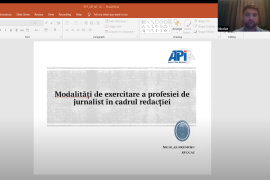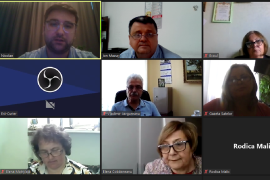back
Contractual Work Relations in Newsroom: What Types of Contracts To Conclude?
Zoom.us capture
The pandemic and energy crises of recent years, as well as Russia's war against Ukraine, have caused many problems for the media as well. This is mainly due to the increase in prices for a number of products and services and to the considerable decrease in advertising revenue. Under these conditions, media managers are looking for solutions to optimize costs and streamline work in newsrooms, including by renegotiating contracts with the employees. At the workshop "Ways to Practice the Journalist Profession in the Newsroom", API consultant Nicolae Frumosu spoke to managers and journalists about some legal tools in this regard. The training which took place at the end of May was attended by 18 managers and journalists of newsrooms beneficiaries of the Center for Consulting and Assistance to Regional Independent Media Outlets.
In the first part of the training, the legal consultant spoke to the participants about the types of employment and collaboration contracts used, including in the media, how to establish employment relationships, the rights and obligations of the parties to a contract, the safeguards established by law for employees, etc. “Under an individual employment contract (IEC), the employee is required to come to the office, to follow a certain work schedule, to fulfill the tasks provided in the contract, etc. The employer is required to provide him with an office, a desk, a chair, a computer, to pay them a salary, to offer them a paid leave, to contribute to their medical leave, to make payments to the social fund, etc. If there is another type of a relationship, not of subordination, the parties may conclude a service contract (SC), as applicable, if there is a permanent activity, usually a remote one, or it may conclude a copyright contract (CC) when the journalist must carry out a certain work, such as studies, videos, investigative reports etc.,” the consultant recounted.
The participants in the workshop, Tatiana Djamanov, director of Radio Orhei and Elena Motricală, director of the newspaper Est-Curier (Criuleni), asked which type of contract was more advantageous for the employer and which one benefited the employee. “For a manger, it is more convenient to conclude a CC, because he does not have to pay 24% to the Social Fund and is not required to offer benefits to the journalist, as in the case of an IEC. However, practice shows that the employer uses this type of contract less often, based on the needs and the specifics of the activity he has. However, an IEC is more advantageous for the employee, as in this way they benefit from all the legal safeguards and from centralized payments to the pension fund. If they do not need such benefits, for example, if they have a permanent job elsewhere, they can plead for the other two types of a contract," Lawyer Frumosu answered. He added that there are situations when the employer can conclude two contracts with the employee: an IEC – for a determined period and a CC – for the execution of a certain work.
According to Elena Cobăsneanu, director of the newspaper Observatorul de Nord (Soroca), media managers in the regions do not resort to a SC or a CC because they do not want to have problems with the Tax Inspectorate or the State Agency for Intellectual Property (AGEPI): “We have not concluded such contracts so far, because it was not very clear to us what could be considered a work of art and what could not. We will document ourselves further and we will certainly use other types of contracts in the future." Olga Popa from the SP newspaper of Bălți recounted that her newsroom had recently concluded copyright contracts with some journalists for the production of video materials and written texts: "After the project completion, an audit company checked their legality and was not satisfied with how we did it. From Nicolae's words, I understand that their dissatisfaction had no legal basis and was rather an attempt to make the newsroom not to practice such contracts in the future, because no payments are made to the state budget. We, however, must primarily emerge from the needs and interests of our media outlet, O. Popa said.
Answering the participant questions about the media products that could be considered works of art and when they could conclude CCs, Lawyer Nicolae Frumosu specified, “According to art. 8 letter d) of the Law on Copyright and Related Rights, news and various facts that represent mere information are not works of art. For example, a news item about an agenda voted in Parliament cannot be the subject of a copyright contract; however, a report in which the journalist analyzes the draft laws voted, documents himself thoroughly, takes opinions from various sources, etc., can certainly be the subject of such a contract. Investigative reports, video spots, various studies, etc. can also be considered works of art.”
In the second part of the training, the participants analyzed other important topics for a newsroom’s work: work discipline, procedure for applying disciplinary sanctions in the three types of contracts, repairing the damage caused to a newsroom by an employee, working time, leaves, etc.
Full workshop recording is available HERE.
In May inst., API held another workshop on "New Issues in Tax and Labor Law for 2022". Since July 2020, the API’s Consulting and Assistance Center has held other 23 thematic online and offline trainings, attended by over 410 newsroom staff.
API member newsrooms and regional media outlets that are not API members but meet the minimum criteria of editorial independence and professional integrity may request the services of the Center by accessing the application on the website www.api.md.
The project "Continuation of the Programof Assiistance for Independent Regional Media Outlets" is implemented by the Association of Independent Press (API) and funded by the US Embassy to the Republic of Moldova. The views expressed hereunder belong to the authors of the project and do not necessarily correspond to those of the US Embassy.

